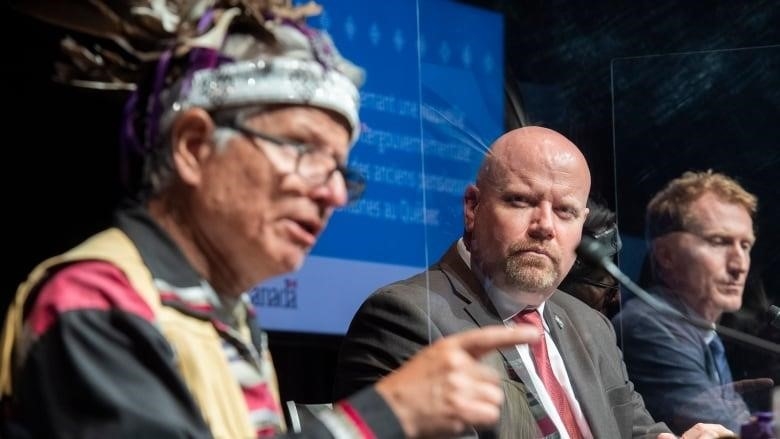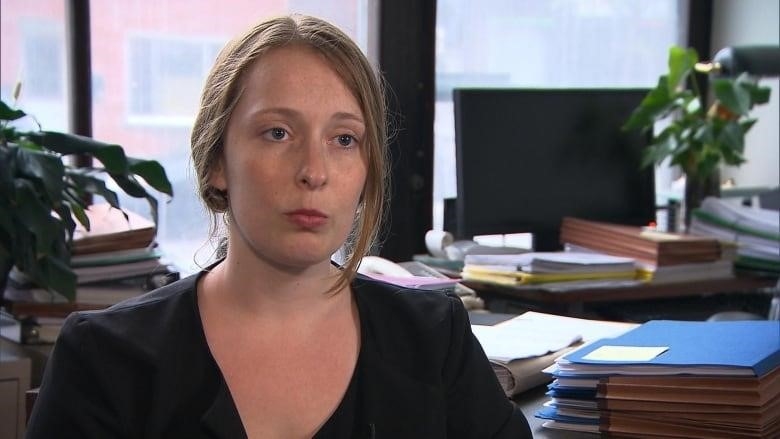
Families who have been tormented by guilt and doubt for decades hope to find answers and peace
WARNING: This story has details that are upsetting..
Two Innu babies who died of whooping cough in a hospital in Baie-Comeau in 1970 will have their bodies dug up. This is a first for a new law in Quebec that is meant to help Indigenous families find out what happened to children who died alone in clinics or hospitals.
In an interview with CBC on Thursday, Ian Lafrenière, the CAQ minister in charge of relations with First Nations and Inuit, said, “It’s hard to believe that some families have been looking for answers for more than 40 years.”
I felt so bad that I had to leave my child. I felt shame, guilt, and a lot of sadness.I don’t know if my son is dead or still alive to this day.– The mother of a baby whose body will be dug up
Radio-Canada’s program EnquêteIn the 1960s and ’70s, several Indigenous families in Quebec were not allowed to go with their sick children to hospitals, where they died. This was not known until 2015, when the stories came to light.
All parties in the National Assembly voted for Lafrenière and the CAQ government to pass a law in 2021.
That law set up a support team to help these Indigenous families get and understand government documents that might tell them more about what happened to their children.
In some situations, the law also lets bodies be dug up. Last week, two court rulings made it possible for the first two bodies to be dug up under the new law.
All of the costs for families going through the process are paid for by the government.
“This is a big step, and we’ll all take it together.”It’s important to me that the families keep their dignity during this terrible time,” said Lafrenière.
Children died alone, and their families weren’t even allowed to look in their coffins
The situations in both cases are the same.
Both stories are about babies born in the North Shore Innu community of Pessamit.
When they were taken to the hospital in Baie-Comeau, Canada, in 1970, one was four months old and the other was less than a month old.

“When both of the kids got sick, the government told their parents they couldn’t go with them. So, both mothers had to send their kids off alone, and both kids ended up dying, said Virginie Dufresne-Lemire, a lawyer who helped the families.
That wasn’t the only bad thing that happened to the families.
“The families were not allowed to open the coffin when they got it,” Dufresne-Lemire said.She said that at the time, government officials told the families that this was for their health.
Dufresne-Lemire says that not only did this make their pain worse, but it has also made families wonder, even though it’s unlikely, if their loved ones are still alive.
Dufresne-Lemire said, “Because of the broken trust in government institutions, there is this doubt that has been there all these years and still is today.”
“They just want to make sure,” she explained. “They want to confirm the person’s identity.”
Shame, guilt and sadnes
A publication ban keeps the names of the two babies and their families from getting out.But the court’s decision includes sworn statements from members of the family.
In her statement, the mother of an infant said, “I blamed myself for not taking my child to the hospital and for not being with him when he died.”
“I felt so guilty for leaving my child,” she said.
“I felt bad about myself, guilty, and very sad.The mother said, “I still don’t know if my son is dead or still alive.”
The other baby boy’s mother died just a few months before the new law was passed, but her daughter gave a sworn statement.
“She was not allowed to open the coffin after her son died, so she never saw his body,” the daughter said.
“My mom is dead, but she still lives on in me. I can feel her feelings and pain, and it hurts me a lot. “I’m taking these steps for her,” she said.
Dozens more case
Lafrenière said that the help team set up by the government is looking into up to 150 more cases of children who died alone.
He said that most of the time, exhumations aren’t needed and that documents found by the team give families the answers they’re looking for.
He said that the first family to get help because of the new law asked him to be there when they got the paperwork saying that their child had died.
“It was a difficult time.”We knew there would be hard times when we passed the law,” he said.
“We knew we’d find out about terrible things that happened in the past. Lafrenière said, “This is the dark history of Quebec.”
Dufresne-Lemire said that the bodies of these two babies will be dug up and DNA tests will be done to make sure they are the same ones.The bodies will be moved and reburied in a place closer to family.
Lafrenière said that the bodies will probably be dug up this summer. He also said that he knows the law has flaws.
He said, “I’m not even sure we’ll get all the information in the end, because we’re talking about remains that have been there since the 1970s.”
“In some situations, we’re not going to make it or find the answers, and that’s hard. He said, “It’s hard.”
In their signed statements, family members also seemed to be okay with this uncertainty.
The sister of one of the babies said, “I don’t know if digging up my brother’s body will make this feeling go away.”
“On the other hand, my family and I will finally have answers to the questions that have always troubled us, and maybe we can then start the healing process,” she said.
